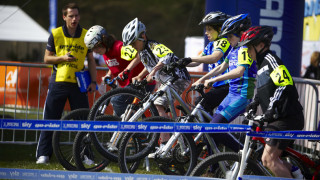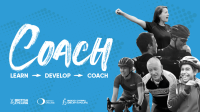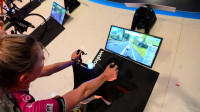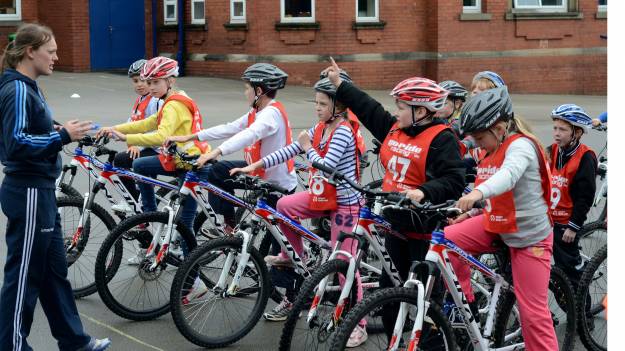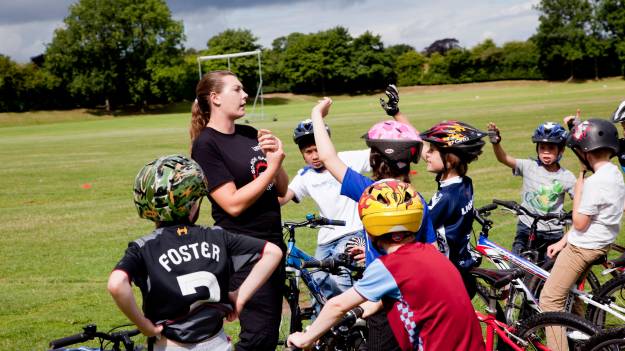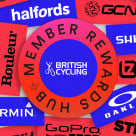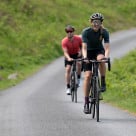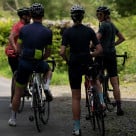With the race season approaching, entry level races - such as Go-Ride Racing and local race events - are great opportunities to expose riders to their first competitive experience of racing.
For many riders the thought of this may be either one of excitement or trepidation. As a coach, you can help riders to make the transition from coaching sessions to racing more seamlessly. In this article, we aim to provide a few hints and tips to get your riders ready.
Organising/finding an event
Firstly, you or the riders should identify a race to compete in. You can use the British Cycling Events calendar to find everything from local Go-Ride Racing events through to national level competition across a range of cycling disciplines, from track leagues to downhill mountain bike events.
Preparing the riders
Once an event has been identified, you should consider the demands of that event, bearing in mind the skills a rider may need to compete.
For example, a road event will differ from a cyclo-cross race because riders will predominately ride on a tarmac surface for road, compared to an off-road surface for cyclo-cross.
Therefore, before you plan any of your sessions, it would be useful to list the demands the rider must meet to take part in the chosen event. Below outlines a brief list of the demands for a Go-Ride Racing Mountain Bike event.
Demands of a Go-Ride Racing Mountain Bike Race
- Ride in and out of the saddle comfortably.
- Able to ride on tarmac and grass with small changes in gradient.
- Brake safely on and off-road surfaces
- Cornering on grass and tarmac.
- Ride with other riders from a mass start and negotiate a course with other riders.
- Be able to change gear on various surfaces.
- Negotiate a full lap of an off-road course in the Level 2 environment.
- Go-Ride Racing events usually have two races, such as an individual time-trial and mass start.
Once you have identified the demands, you can create an outline plan for how you could cover them in sessions leading up to the event.
You may not be able to cover them all, so you may choose to prioritise some of the more ‘important’ skills. Below provides an example of an outline plan of techniques and the focus for six sessions that could be coached for riders competing in their first Go-Ride Racing Mountain Bike event.
First Race beginner riders - Go-Ride Racing Mountain Bike
1. Ready position and weight shift
By the end of the session, riders will be able to ride out of the saddle and demonstrate the ready position and weight shift appropriately for on and off-road terrain
2. Braking
By the end of the session, riders will be able to stop their bikes safely on grass and tarmac surfaces
3. Pedalling and gear selection
By the end of the session, riders will be able to demonstrate the correct foot position on the pedal and be able to change gear appropriately depending on terrain and surfaces
4. Cornering
By the end of the session, riders will be able to negotiate a series of left and right corners on tarmac and grass
5. Group riding
By the end of the session, riders will be able to perform a mass start with other riders and negotiate a simple mountain course
6. Mock sign on and race
By the end of the session, riders will understand how to sign on for a race and fit a number board to their bike. Riders will also compete in a time trial and mass start race, negotiating a simple MTB course
Even over the course of six coaching sessions, there are a number of demands that haven’t been covered, which highlights how many more sessions you can run with the riders to prepare them for an event.
Below is a summary of a few key points leading up to a race event:
- Consider what techniques the riders will need to negotiate the race, these should form the basis of your sessions.
- Include a few mock races in your sessions to allow the riders to get a feel for racing and competition.
- During mock race sessions, you could run through other race day practicalities such as signing on and fitting their number board to their bike.
Race day
What can you do on race day to support as a coach? In essence, you should be there as support for riders, helping them to remain calm and focused on what they have practiced in the coaching sessions.
You may help less experienced riders with any concerns surrounding the event, by helping them to the sign on, finding out what time their race starts etc.
The main point here is that you should be calm and composed, while avoiding focussing on the outcome of the race as this could have a detrimental effect on riders. Instead, ensure that the racing environment is one for learning, development and fun.
After the event, it can be easy to praise only the riders that have finished in the top positions, but consider asking the riders: Did they enjoy racing? What did they learn? Would they do anything differently next time? Would they like to do it again?
Race day don’ts
- Focus on outcome of the event - it isn’t life or death whether a rider wins or not. As long as they have tried their best, that is all you can ask for.
- Introduce new techniques - ie BMX riders who haven’t jumped before should avoid trying to learn how to jump a double at a race. The riders should focus on racing and putting into practice what they have learnt in their coaching sessions, with new techniques being something to work on in future coaching sessions.
- Race the race for the riders – shouting instructions at the riders while they are racing won’t allow them to learn for themselves and develop awareness if they are constantly told what to do.
What can I do with more experienced riders who compete regularly?
As riders progress and decide to compete more regularly, here are a few other considerations for your coaching sessions:
- Consider race preparation
- Ask riders to write a kit list for racing, to get them thinking about what they may need to take with them to a race.
- Practice warming up for competition. You could run roller or turbo sessions to get riders to practice warming-up strategies that they could use for competition.
- Continue to practice the basic and intermediate techniques
- Challenge the riders in different coaching environments. Avoid coaching on the same corner, uphill section; expose riders to a variety of environments to help them learn.
- Adopt a multi-sport approach. Riders could be introduced to contrasting disciplines, such as road and BMX to develop a solid foundation of bike handling skills.
- Practice race-specific scenarios in coaching sessions
- Set up scenarios for riders to learn decision making ie road - closing a gap between a peloton and a breakaway group.
- Race day
- Take a back seat, allow riders to manage their own race preparation. Observe from the sidelines, even if you see them making mistakes. Mistakes can be a valuable learning tool for the riders, but also can form a good point of discussion with the riders post-race.

